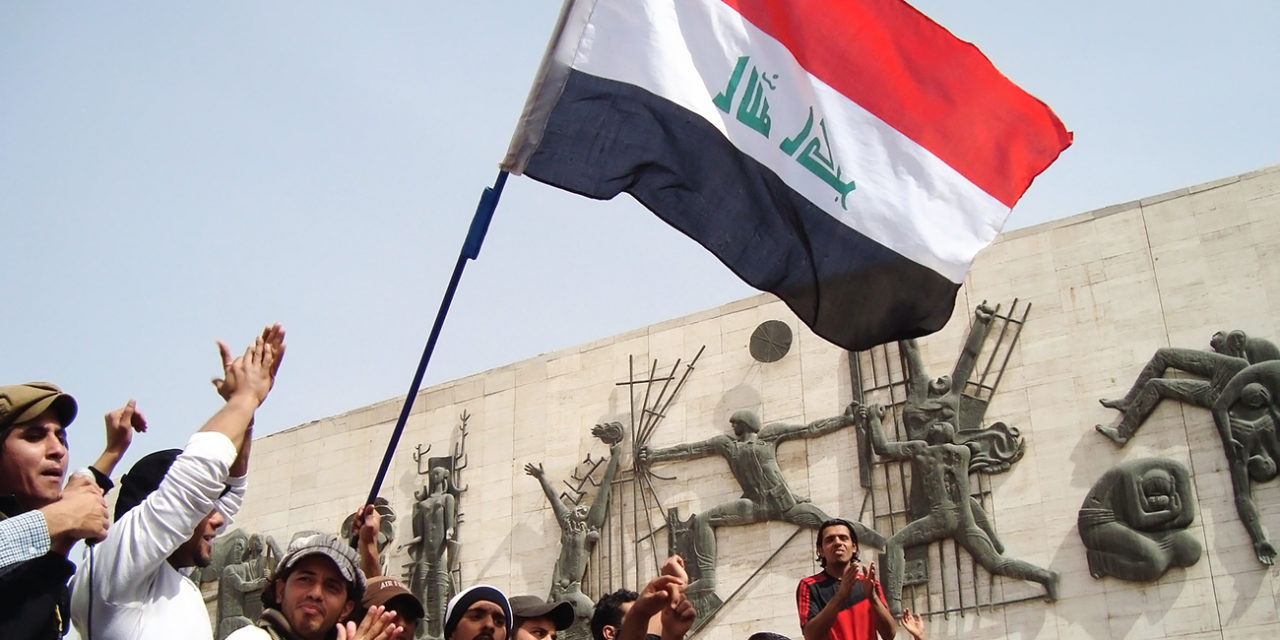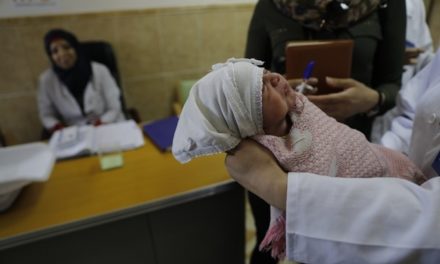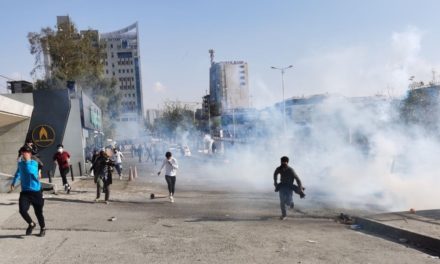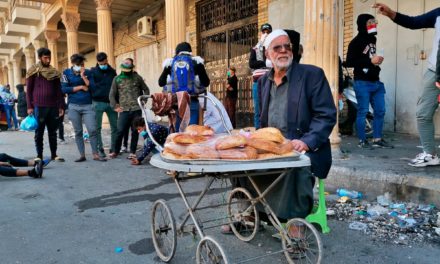Baghdad’s Tahrir Square (Faeq Ali)
Back in 2002, Iraq had a national referendum on Saddam Hussein’s presidency. I was an adolescent back then, but even I had a clear idea that not voting for Saddam was not an option. If you were an Iraqi who was alive and breathing at the time then you simply had to say yes to Saddam being your president for life. He won 100% of the votes. I still vividly remember seeing ecstatic people on national TV casting their votes for him with their own blood instead of using pens. It was utterly insane.
Fast forward to 16 years later, the year is 2018 and we are less than three weeks away from having parliamentary elections that will shape Iraq’s future for the next four years. Prime Minister Haider Al-Abadi is seeking re-election and is facing fierce competition and intense criticism over the government’s disappointing handling of many important issues including massive unemployment, dwindling reconstruction endeavors, lack of public services, rampant corruption, etc. People are rightly disillusioned with the entire political elite and many are considering boycotting the election due to the fact that, “all candidates are corrupt to their very core so why bother?’’.
As someone who grew up in this country under the rule of Saddam, I have always been fascinated by the political discourse in post-2003 Iraq. Iraqi democracy is flawed and far from perfect. But it is extremely important to keep reminding people not to underestimate their relative ability to pick their leaders freely. Human memory is unfortunately short and especially for younger Iraqis who did not grow up in an ultimate autocracy, it becomes too easy to take for granted their relative capability of making a choice.
Now when I say relative, it is because there are many factors that could potentially interfere with the ability of many Iraqis to make an informed decision regarding their electoral choice. If you are someone who does not live in Iraq and you are looking to read analysis pieces about general elections in this country, you will hear one thing being repeatedly blamed (and rightfully so) for the substantial shortcomings in the electoral process; corruption. Stories are circulating on social media of corrupt candidates preying on the poor and disadvantaged and offering them money, food, etc. in exchange for their votes. When people are extremely poor and have no proper education or prospects for a better future for them and their families then selling their votes for some cash or food or blankets is their own way of getting back at the system that failed them miserably. The grievances of these people are perfectly legitimate and we must address them with tact and empathy instead of dismissing them as ignorant people who are unappreciative of the crucial value of their votes.
Iraqis voting along sectarian and ethnic lines is also a real problem, although interestingly enough during this election season you can hear many Iraqis talk more about pressing issues than about the ethno-sectarian identities of electoral candidates. That is certainly an encouraging phenomenon and a step in the right direction, but we still have a long way to go before identity politics in this country becomes a thing of the past.
I have had endless conversations with many people who are considering boycotting the election and the main argument I keep hearing from all of them always goes along the lines of: “All candidates are trash. There is no possibility for real change. The results are already decided. There is no reason to be hopeful’’.
No, folks, your apathy does not get a free pass this time round, not when the stakes are this high.
You say that all candidates are trash? I regret to tell you that you still have to do your homework and ask around, enquire about them and look them up. Ask your family, friends, coworkers, and neighbours and consider their feedback before you decide. God knows that there is no such thing as a perfect electoral candidate, especially in Iraq. But then again, what country has such unicorns?
You say that there is no possibility for real change and that there is no reason to be hopeful? Well, that can often be true, but not always. This country was on the verge of falling apart permanently back in 2014, Da’ish had conquered large swathes of Iraqi territory and a third of Iraq was virtually occupied by them. Four years later, the heroes of the Iraqi armed forces have defeated Da’ish militarily. Although Da’ish has been trying to bounce back and reignite its insurgency, federal authority has been successfully restored in Kirkuk Province and other disputed territories. It is true that the general situation in this country can often be grim, but one can always find reasons to be hopeful about even under the most difficult circumstances. Succumbing to desperation and pessimism is certainly easier and feels more natural and less exhausting, but clinging to hope even when you have very few reasons to be hopeful about takes immense courage.
The other day I read that TIME Magazine had picked Iraq’s Prime Minister Haider Al-Abadi as one of its 100 most influential people in the world for 2018, and I immediately remembered TIME’s infamous cover from June 2014: It had a burning map of Iraq drawn on it with a caption that read “The End of Iraq’’.
We have come a long way, but we are also still too far behind. This is a very critical time and we must do whatever it takes to keep the momentum going.
So no, your “there is no hope and nothing is really going to change’’ approach is not going to cut it this time, I am afraid. We can afford to be lazy and apathetic all year round but not on election day. Your vote matters, so please do not waste it.
Iraq is now a democracy, albeit an imperfect one. No one can force people to vote against their will if they do not want to. People are not going to be executed or imprisoned because they choose to abstain from voting. But if you are choosing to boycott the election now and then complain for the next four years about how corrupt and inadequate our government is then I have some bad news for you; you are a part of the problem. Sidelining yourself and silencing your own voice will only serve to help corruption thrive even more. There is still time to come around, Iraq needs you so please go the extra mile and vote.

Noor Ali
Noor Ali is a resident of Baghdad and is a Middle East observer, mainly focusing on Iraqi social justice & women’s rights.










